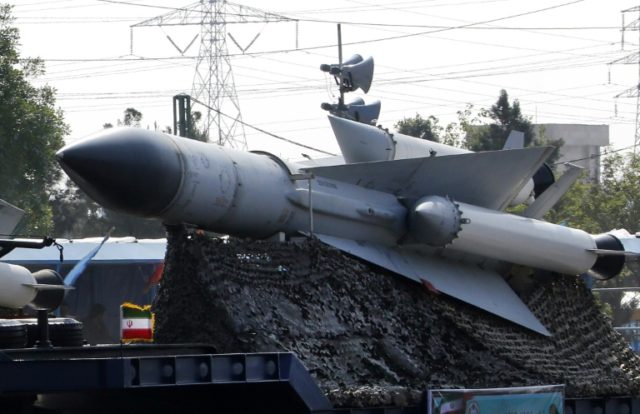Islamic Revolutionary Guard Corps (IRGC) Brigadier General Ali Fadavi vowed on Friday to continue testing missiles and researching new weapons in defiance of U.S. sanctions against Iran.
“Is it possible to stop breathing?” Fadavi asked when Iran’s state-run IRNA news agency asked if weapons testing would be halted.
“The harsher the sanctions get, the more defensive capabilities Iran will achieve,” he insisted.
Fadavi was the latest in a string of Iranian officials to insist that missile tests will continue, Iran is making great strides in missile technology, and U.S. sanctions will only inspire Tehran to work harder on its weapons. The Iranians insist their test launches do not violate U.N. resolutions or the terms of the Iran nuclear deal, formally known as the Joint Comprehensive Plan of Action (JCPOA).
France and the United Kingdom joined the United States in begging to disagree with those assertions in early December, an encouraging sign of support for the Trump administration and particularly Secretary of State Mike Pompeo, who has been working hard to convince the Europeans to reconsider their support for the JCPOA.
The same medium-range ballistic missile test Fadavi boasted about on Friday was the catalyst for second thoughts in Paris and London, as the UK Guardian reported on December 3:
The UK foreign secretary, Jeremy Hunt, said in a statement on Saturday he was “deeply concerned by Iran’s test firing of a medium-range ballistic missile. Provocative, threatening and inconsistent with UNSCR 2231. Our support for JCPOA in no way lessens our concern at Iran’s destabilising missile programme and determination that it should cease.”
His remarks were backed up by the UK representative on the EU’s political and security committee, Paul Johnston, who said it was important to address the breadth of the Iranian challenge, and added that “important discussions would be held at the EU foreign affairs council on 10 December”.
On Monday the French president’s office echoed the UK in saying it was deeply concerned and the tests were “provocative and destabilizing.” It urged Iran to stop all testing of ballistic missiles capable of carrying nuclear warheads.
Iran’s case rests on asserting that U.N. resolutions encourage them to refrain from missile testing but do not forbid the tests outright. Last week, Pompeo urged the U.N. Security Council to consider new or revised resolutions that would explicitly ban the tests.
“Iran has exploited the goodwill of nations and defied multiple Security Council resolutions in its quest for a robust ballistic missile force,” Pompeo charged. “The United States will never stand for this. No nation that seeks peace and prosperity in the Middle East should, either.”
Pompeo argued that Iran is using the JCPOA as a shield against “accountability for the risks it presents to the world.”
There is some debate about the true capabilities of the missile Iran tested at the beginning of December and whether it represented a real advance in Iranian capabilities. In theory, the missile could hit targets in much of Europe and anywhere in the Middle East.

COMMENTS
Please let us know if you're having issues with commenting.